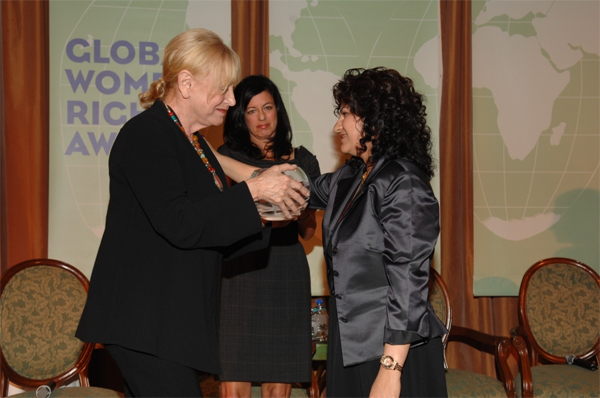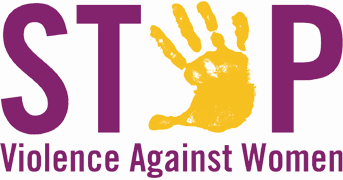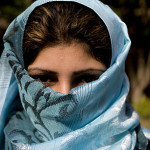An article by Yanar Mohammed written for TerraViva magazine which was dedicated for the UN Resolution 1325 on women in areas of conflict. A shorter version was published in their last issue.
The UN resolution 1325 was passed unanimously ten years ago for a good reason. Women in conflict zones never participate in decision-making throughout or towards the end of conflicts. They rarely get the protection they need against gender-based and sexual violence. In time of war and military conflict, women’s rights in practice and legislation are lost due to a prevailing culture of military and para-military violence which is usually practiced by males. The post-conflict transitional times call for new legislation, which rules the lives of many generations to come, still regularly lack any gender-based perspectives.
Early-on in 2003, women of Iraq were not aware of the serious consequences of an inclusive military invasion which ousted and uprooted all government institutions. With well-meant naivety, we thought we can turn a dark scenario into a bright one, one that is only lacking a people’s ideology of freedom and equality, until we were stricken by the stubborn facts on the ground, or rather the atrocities which found their way to women and children through the gaps of insecurity and chaos.
These atrocities seemed to target women in many ways and quite often claimed lives and destinies of many who were dear to us. While unable to awake from a nightmare which was imposed by an illegal and unjustified invasion, we still had to deal with the aftermath which struck women’s lives more profoundly and fatally than the males, especially those on the top of the food chain, those who rule, exploit, and thrive from these atrocities.
OWFI had decided then to watch, document, and denounce. We were voicing out the sufferings of the killed, lost and exploited in the society. As dangerous as the task was, persistence at it helped us create a small albeit bold base of fierce women-activists who did not compromise or appeal to the violent warlords, or rather the winners of the conflict, who have mostly become the leaders of the so-called democracy.
Creating an oasis of Feminist Resistance in Iraq was meant to defend a uncompromised right of Iraqi women to participate in decision making, get the protection they deserve, maintain their threatened women’s rights, and force a gender-based perspective for the legislation of a secular egalitarian and non-ethnic constitution.
Challenging women’s enemies was our main task throughout seven years of surviving in a fundamentalist militia culture which made us witnesses to all the above-mentioned atrocities, which were no longer abstract concepts on paper. They became nightmares which we learnt to live with, escape from, and still document, and denounce.
Mass killings of women in the south: a mix-up of religious militia cleansing and
encouragement of honour-killings by self claimed vigilantes. Although more than 300 women were killed in the city of Basra alone between 2006-2008, the criminals still live free and have the upper hand in the society. Simultaneously, honour-killings continue to take place in alarming rates in all the cities of the center, south, and North. No legislation or campaign have been administered by any governmental facility or media against these crimes which spare lives of hundreds of women every year. In addition, a thriving practice of FGM takes place in the Kurdish north, and female suicide rates rise as the killers have found a way to impose shame on the females and let them kill themselves, thus leaving the males unaccused.
Trafficking into modern-day sexual slavery: In every neighbourhood in the capital, there is a brothel where teenagers are bought and sold-and sometimes exported into a “good” financial deal for an Arab Gulf countries. Girls as young as 11 or 12 are priced locally and cross-borders for the ultra rich Arab sheiks of the gulf. A visit to the female prisons -adult and juvenile- reveals that more than half the inmates are victims of trafficking. The other surprise is that the justice system treats them as criminals and not as victims. When OWFI confronted a female parliamentarian Al Mousawi, with the alarming numbers of females plagued by trafficking, her response was to accuse us of fabricating lies against the “honour” of Iraqi women.
Four million female population of widows and orphans of war: mostly have no education, male protection or financial support. Consecutive wars and previously imposed UN economic sanctions have left them destitute, displaced or homeless. Many become victims to trafficking, pleasure marriages, or prostitution in a society where systemic violence of militia members can spare their lives anytime, with no legal punishment.
Economic insecurity of a disempowered female population, is not a concern of the state. The surplus of governmental budget, 52 billion dollars, serves the military needs of rivaling militias who have turned into “political” groups overnight, or for compensating so-called US victims of the late Iraqi dictator, while teenage girls get bought and sold daily among traffickers and brothels with nobody to think of their human rights, as these decisions are made by enemies of women.
Healthcare security is not the responsibility of the state anymore. Giving birth to children in decent hospitals has become unaffordable to the majority, as hospitalization is gradually getting privatized. Neither do the current Iraqi hospitals treat numerous kinds of cancer which had increased due to an unprecedented exposure to depleted uranium because of two consecutive American wars on Iraq.
Legislation of female enslavement: After months of political dispute on finalizing the constitution in 2005, the Shiite Iran-based militias proved to be the strongest on the ground and passed their version of a most archaic constitution which determines sharia as the main resource for legislation. The constitution was immediately congratulated as the “most democratic constitution in the Middle East” by the US Ambassador to the UN, Zalmay Khalilzad. By the new constitution, Polygamy is allowed, abortion is illegal, economic rights are unequal – inheritance for females is half of males. Many forms of domestic violence are legal.
Misogynist female parliamentarians: When most of the representatives of women (more than 25% of parliament) do not introduce a gender perspective into the parliamentarian sessions, but confront and discredit feminist efforts on the ground, women’s representation as it comes in UN Resolution 1325 fails. In one of the regional conferences, a female parliamentarian Damluji, scolded many of the Iraqi feminists for not reporting their findings to the government. In other words, she was a representative of the government and not of the women of Iraq.
NGO-harassment governmental office: When building a new and strong government means assigning an establishment for investigating NGO work – meant originally to be an NGO-assistance office. Moreover, those facilities were assigned to political Islamist officers who accuse feminists of promiscuity and promoting prostitution. Then, the gender-based perspective meant by UN Resolution 1325 has not been met.
The government of Iraq had successfully swept away or manipulated all the objectives of the UN Resolution1325 while claiming to be fair to women. The secular freedom-loving women of Iraq find themselves more vulnerable to a patriarchal and religious violent outbreak which is supported by both militia groups and the US militarization of Iraq.
OWFI has fortunately gained alliances among the women of the world who helped support the initiative of the Feminist Resistance of Iraq, by getting more resources to it, most of which was the MDG3 Fund from the Netherlands. When there is a women’s will, there is a local and international way. All we needs is the support and solidarity of the freedom-loving people of the world.
Yanar Mohammed – OWFI president
19-10-2010




